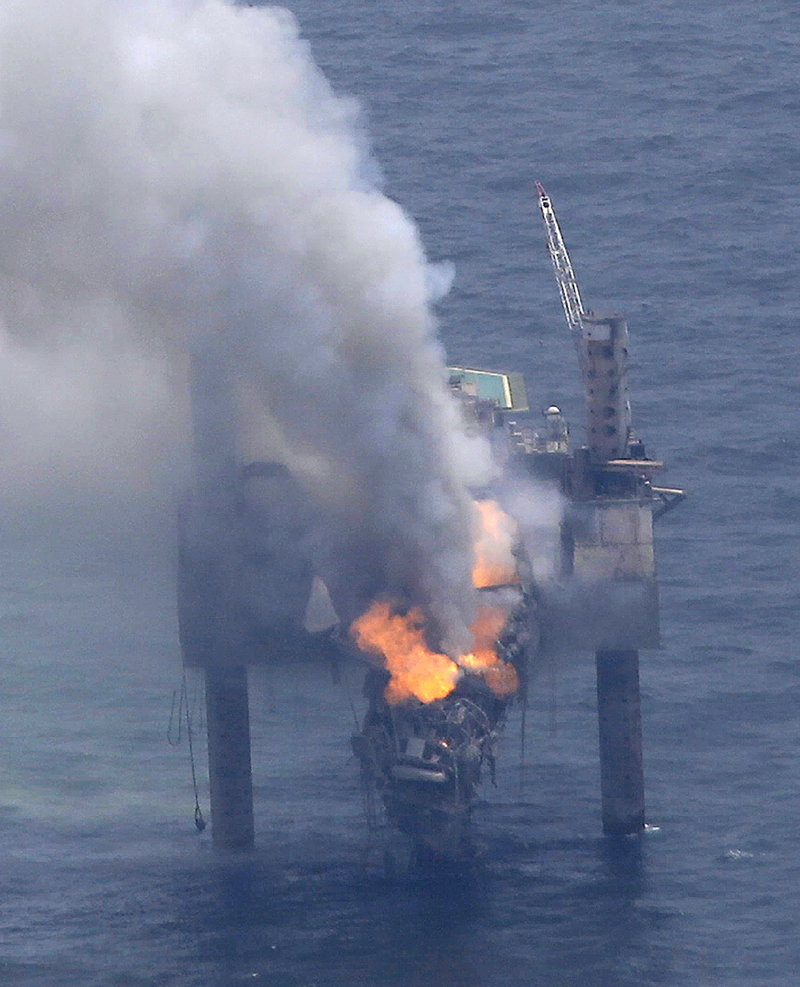NEW ORLEANS – A blown-out natural gas well blazing off Louisiana’s coast poses fewer environmental dangers than past offshore accidents because it appears to primarily involve gas that disperses relatively easily, scientists said Wednesday.
“A gas well’s not going to result in any kind of major pollution — perhaps not even significant pollution if it’s burning,” said Ted Bourgoyne, the former chair of Louisiana State University’s petroleum engineering department. He now runs the consultancy Bourgoyne Enterprises Inc. During flyovers Wednesday morning, Federal inspectors saw no sheens near the well, which indicates the gas is burning off without releasing oil or other hydrocarbons — which are sometimes found in gas wells — into the water. While it’s not clear if the well in Tuesday’s blowout contained any crude oil, officials and scientists agree that the latest mishap shouldn’t be nearly as damaging as the BP oil spill that sent crude oil oozing ashore in 2010.
The fire broke out late Tuesday hours after the blowout, authorities said. Forty-four workers were evacuated from a drilling rig at the site. No injuries were reported.
University of Georgia marine scientist Samantha “Mandy” Joye also said the pollution and health dangers posed by a gas well are quite different than those posed at the well where the Deepwater Horizon rig blew up in 2010, killing 11 people and spewing millions of gallons of oil for weeks.
“The biggest danger from gas is that it is extremely flammable. At high concentration, gas exposure can cause health issues (vomiting, headaches, and worse) but such high levels are not likely to be reached in warm, shallow waters,” Joye said in an email response to questions.
That’s not to say there were no dangers. The Coast Guard maintained traffic restrictions within 500 meters of the site and the Federal Aviation Administration restricted aircraft up to 2,000 feet over the area.
Tuesday’s blowout occurred at a drilling rig adjacent to a natural gas platform that wasn’t producing gas at the time. Gas spewed throughout the day and ignited late Tuesday night. The cause of the blowout was under investigation being overseen by the federal Bureau of Safety and Environmental Enforcement.
Rig owner Hercules Offshore Inc. said the plan to stop the flow of gas may include drilling a relief well to divert the gas from the accident site, which could take weeks.
“We are singularly focused on coming up with an action plan that would regain control over the well,” said James Noe, an executive with Hercules, which was operating the rig for Walters Oil & Gas, an exploration and production company.
Natural gas — mostly methane — is far more soluble than oil, meaning it more easily dissolves, dilutes and disperses than crude oil, said Donald Boesch, president of the University of Maryland’s Center for Environmental Science and a member of the federal panel that investigated the BP oil spill. That means concentrations would be are far less lethal to the marine environment, he said.
Joye said the accident, the second blowout off the Louisiana coast this month, does raise concerns about whether more regulation is needed.
Environmentalists in Louisiana said the accident proves the need for strong oversight of offshore operations.
“We won’t have the oil like we did in 2010, but still this is something we need to watch closely,” said Darryl Maleck-Wiley of the Sierra Club. “Once again this is highlighting the dangerous nature of oil and gas operations in the Gulf and that we need aggressive inspection programs of these operations by the federal government.”
Copy the Story Link
Send questions/comments to the editors.



Success. Please wait for the page to reload. If the page does not reload within 5 seconds, please refresh the page.
Enter your email and password to access comments.
Hi, to comment on stories you must . This profile is in addition to your subscription and website login.
Already have a commenting profile? .
Invalid username/password.
Please check your email to confirm and complete your registration.
Only subscribers are eligible to post comments. Please subscribe or login first for digital access. Here’s why.
Use the form below to reset your password. When you've submitted your account email, we will send an email with a reset code.